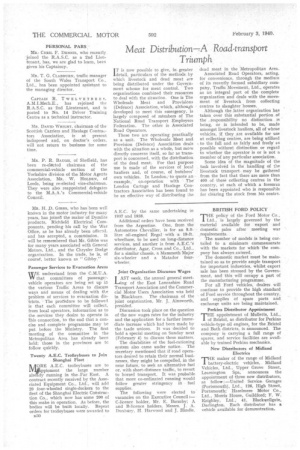Meat Distribution—TA Road-transport Triumph
Page 50

If you've noticed an error in this article please click here to report it so we can fix it.
TT is now possible to give, in greater 'detail, particulars of the methods by which livestock and dead meat are being distributed under the Government scheme for meat control. Two organizations combined their resources to deal with the situation. One is The Wholesale Meat and Provisions (Defence) Association, which, although developed to meet this emergency, is largely composed of members of The National Road Transport .Employers Federation. The other is Associated Road Operators.
These two are operating practically as a unit. The Wholesale Meat and Provision (Defence) Association deals with the situation as a whole, but more directly concerns itself, so far as transport is concerned, with the distribution of the dead meat. For that purpose use is made• of the services of local hauliers and, of course, of butchers' own vehicles. In London,-to quote an example, co-operation with The' London Cartage and Haulage Contractors Association has been found to be an effective way of distributing the dead meat in the Metropolitan Area.
Associated Road Operators, acting, for convenience, through the medium of its recently formed subsidiary company, Traffic Movement, Ltd., operates as an integral part of the complete organization and deals with the movement of livestock from collecting centres to slaughter houses.
Although the latter organization has taken over this substantial portion of the . responsibility no distinction is being, or is intended to be, made amongst livestock hauliers, all of whose vehicles, if they are available for use at collecting centres, are being utilized to the full and as fairly and freely as possible without distinction or regard to whether the operator is or is not a member of any particular association.
Some idea of the magnitude of the task involved in the handling of the livestock transport may be gathered from the fact that there are more than 400 of these collecting centres in the country, at each of which a foreman has been appointed who is responsible for clearing the stock from his centre.








































































































